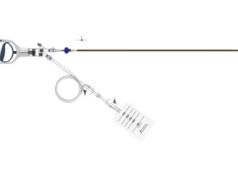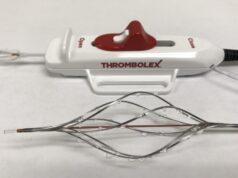While some questions remain regarding infrequent or rare side effects of ultrasound-guided foam sclerotherapy, the overwhelming body of published clinical evidence supports the proposition that this treatment modality appears to be a reasonably safe method of superficial venous ablation, according to Dr Nick Morrison, Phoenix, Arizona, USA. Morrison will open the CX Venous Day, on Tuesday 7 April, with a talk on foam sclerotherapy.
“Efficacy, simplicity, economy, and serial applications have made ultrasound-guided foam sclerotherapy an attractive and efficient treatment modality in the armamentarium of the phlebologist,” Morrison wrote, anticipating his presentation.
Other techniques on truncal vein management will be updated in the session: radiofrequency ablation (Ian Franklin, Imperial College, London, UK), laser (Lowell Kabnick, New York, USA, and Issa Nyamekye, Worcester, UK), endoscopically assisted vein ablation (Afshin Assadian, Vienna, Austria), and crossectomy and sclerotherapy (George Geroulakos, London, UK). A summary of methods and patient preference issues will be presented by Dr Alun Davies, Imperial College, London, UK.
Three debates will then take place in the session: on outcomes and classifications, drugs for chronic venous disease, and thrombolysis. Tony Comerota will argue that thrombolysis is the gold standard for management of iliofemoral DVT. Jonothan Earnshaw, however, will say that the procedure is not a gold standard, but just a gimmick: “I’m a great admirer of Tony Comerota’s work, and there is clearly a role for thrombolysis in selective patients, but it is not a gold standard, and I am going in there to win the vote on that.”
“We do not know enough about the natural history of thrombus resolution or the long-term effects of thrombolysis. We cannot accept thrombolysis as a gold standard until we have good, randomised evidence, which does not exist!”
Also, Earnshaw argues that until venous experts are prepared to agree that thrombolysis can be delivered across the board with equity for all patients, above treatments like mechanical thrombectomy, it isn’t a gold standard.
After that, the focus will be on the management of deep vein disease. Professor Iris Baumgartner (Bern, Switzerland) will talk on “Endovascular treatment of arteriovenous malformations”, followed by Dr Raman Uberoi on “IVC Filters: Indications and evidence”. “Filters can successfully prevent pulmonary embolism with low complication rates,” writes Uberoi.
Dr Peter Franks, London, UK, will address the “Role of silver in dressings and optimal compression for venous ulcers”, and Dr Charles McCollum, Manchester, UK, will talk on “Does DVT matter after hip and knee surgery?”. The following presentations will be “The management of Klippel-Trenaunay Syndrome”, by Dr Peter Gloviczki, Minnesota, USA, and “Venous thromboembolism and malignant disease”, by Dr David Bergqvist, Uppsala, Sweden.
The session will be concluded by Dr Tony Comerota, Toledo, USA, talking on “American College of Chest Physicians. Recommendations on DVT management?”
Register now on www.cxsymposium.com.
Download the special CX 31 issue of Vascular News by clicking on the icon to the right.











